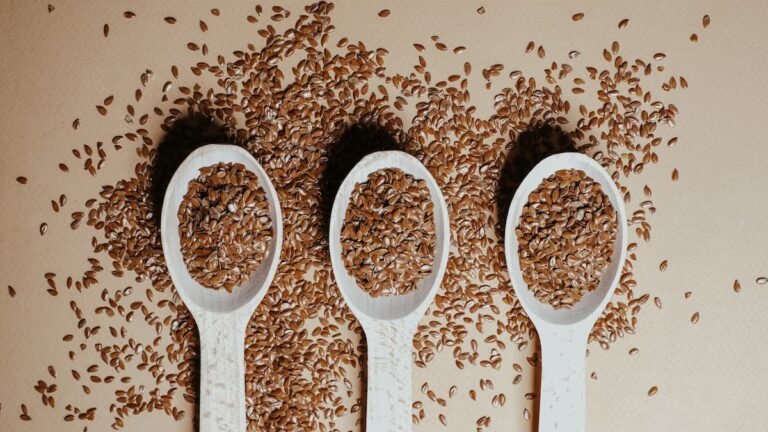Overview
Flaxseed and Chia Seed are rich nutritious foods. Both are excellent sources of α-linolenic acid, fiber, protein, vitamins, and minerals. They also contain phytochemicals that have high therapeutic potential. Hence, if you add them to your diet, they give immense health benefits. This article on Flaxseed vs Chia seed provides a head-to-head comparison of nutritional facts and benefits. Also, it answers which one is healthier under specific health conditions.
Flaxseed
Flax seeds, derived from the flax plant (Linum usitatissimum), have garnered widespread acclaim for their nutritional prowess and health benefits. Packed with omega-3 fatty acids, lignans, and fiber, these tiny seeds contribute to heart health, aiding in the reduction of cholesterol levels and inflammation. The high fiber content promotes digestive well-being, regulating bowel movements and fostering a healthy gut microbiome.
Beyond their nutritional profile, flax seeds exhibit versatility in culinary applications. Adding a nutty flavor and subtle crunch, they seamlessly integrate into smoothies, yogurt, or baked goods. Ground flax seeds, in particular, enhance recipes as an egg substitute for those seeking plant-based alternatives. The lignans found in flax seeds also possess antioxidant properties, potentially combating oxidative stress and supporting overall immune function. Whether consumed for their nutritional value or culinary adaptability, flax seeds stand as a nutritional powerhouse contributing to a well-rounded and health-conscious diet.
Chia Seed
Chia seeds, derived from the Salvia hispanica plant, have gained popularity as a superfood owing to their remarkable nutritional profile and diverse health benefits. These tiny seeds are rich in omega-3 fatty acids, fiber, protein, and essential minerals like calcium, phosphorus, and magnesium. The high omega-3 content supports heart health and may help reduce inflammation in the body.
Chia seeds possess an exceptional ability to absorb liquid, forming a gel-like consistency that aids in digestion and promotes a feeling of fullness. This characteristic makes them a valuable addition to smoothies, puddings, or as a topping for yogurt and salads. Additionally, their versatility extends to culinary applications, as they can be used as a vegan egg substitute in various recipes. With their nutrient density and culinary adaptability, chia seeds stand out as a convenient and health-promoting ingredient for those seeking a balanced and nutritious diet.
Flaxseed Vs Chia Seed – Nutritional Facts
Flaxseeds and chia seeds are both celebrated for their nutritional benefits, yet they differ slightly in their nutrient composition.
Flaxseeds:
- Omega-3 Fatty Acids: Flaxseeds are particularly rich in alpha-linolenic acid (ALA), a type of omega-3 fatty acid that supports heart health.
- Fiber: Flaxseeds are an excellent source of both soluble and insoluble fiber, aiding digestion and promoting a feeling of fullness.
- Lignans: They contain high levels of lignans, plant compounds with antioxidant properties that may contribute to various health benefits.
- Protein: Flaxseeds provide a moderate amount of protein, supporting muscle health and overall body function.
Chia Seeds:
- Omega-3 Fatty Acids: Chia seeds also contain ALA, providing a plant-based source of omega-3s.
- Fiber: Chia seeds are rich in soluble fiber, forming a gel-like substance when mixed with liquid, which aids in digestion and slows down the absorption of nutrients.
- Protein: Chia seeds contain a notable amount of protein, making them a valuable addition to vegetarian and vegan diets.
- Calcium: Chia seeds are a good source of calcium, crucial for maintaining bone health.
In summary, both flaxseeds and chia seeds offer unique nutritional benefits. Flaxseeds excel in omega-3 fatty acids and lignans, while chia seeds stand out for their gel-forming fiber and higher calcium content. Including a variety of seeds in your diet can contribute to overall health and nutrition.
Flaxseed Vs Chia Seed – Health Benefits
Flaxseeds and chia seeds share several health benefits, but their distinct nutrient profiles contribute to different advantages:
Flaxseeds:
- Heart Health: Rich in alpha-linolenic acid (ALA), a type of omega-3 fatty acid, flaxseeds support cardiovascular health by helping to reduce cholesterol levels and inflammation.
- Digestive Health: The high fiber content of flaxseeds promotes regular bowel movements, aids in digestion, and may help prevent constipation.
- Cancer Prevention: Flaxseeds contain lignans, which have antioxidant properties and may contribute to a reduced risk of certain cancers, especially breast and prostate cancers.
- Hormonal Balance: Lignans in flaxseeds may have estrogenic properties, potentially supporting hormonal balance in the body.
Chia Seeds:
- Hydration and Satiety: Chia seeds absorb liquid and form a gel-like substance, which can help keep you hydrated and contribute to a feeling of fullness, supporting weight management.
- Heart Health: Omega-3 fatty acids in chia seeds benefit heart health by reducing blood pressure, cholesterol levels, and inflammation.
- Bone Health: Chia seeds are a good source of calcium, phosphorus, and magnesium, supporting bone health and preventing osteoporosis.
- Blood Sugar Control: The soluble fiber in chia seeds may help stabilize blood sugar levels, making them beneficial for individuals with diabetes.
Incorporating either or both of these seeds into a balanced diet can provide a range of health benefits. It’s important to consider individual nutritional needs and preferences when choosing between flaxseeds and chia seeds.
Flaxseed Vs Chia Seed – FAQs
No. While flaxseeds and chia seeds have some commonalities, their nutritional compositions, and culinary properties make them unique and suitable for different dietary preferences and nutritional goals.
Absolutely! Combining flaxseeds and chia seeds can be a nutritious and flavorful addition to your diet. Both seeds offer a range of health benefits, and when consumed together, they provide a diverse array of nutrients, including omega-3 fatty acids, fiber, and essential minerals.
Here are some ways you can incorporate both flaxseeds and chia seeds into your diet:
Smoothies: Add a tablespoon of each seed to your favorite smoothie for an extra boost of nutrients and a pleasant texture.
Yogurt Parfaits: Sprinkle a mixture of flaxseeds and chia seeds over yogurt, along with fruits and nuts, for a tasty and nutritious parfait.
Oatmeal or Cereal Toppings: Stir a combination of flaxseeds and chia seeds into your morning oatmeal or cereal for added crunch and nutritional value.
Baking: Include both seeds in recipes for muffins, pancakes, or energy bars to enhance the nutritional content of your baked goods.
Salads: Sprinkle a blend of flaxseeds and chia seeds on top of salads to add a nutritional boost and a pleasant crunch.
It’s essential to stay mindful of the overall quantity of seeds you consume, as they are calorie-dense. As with any dietary changes, it’s a good idea to consult with a healthcare professional or a nutritionist to ensure that it aligns with your individual health goals and needs.
The health benefits of flaxseeds and chia seeds are comparable, and both can be part of a healthy diet. However, they have different nutritional profiles, and the choice between them might depend on specific dietary preferences and health goals. Here are some considerations:
Flaxseeds:
Rich in alpha-linolenic acid (ALA), a type of omega-3 fatty acid beneficial for heart health.
High in lignans, which have antioxidant properties and may contribute to various health benefits.
Good source of both soluble and insoluble fiber, supporting digestive health.
Contains moderate amounts of protein.
Chia Seeds:
Provide a balance of omega-3 and omega-6 fatty acids, supporting heart health.
Rich in soluble fiber, which forms a gel-like substance when mixed with liquid, aiding digestion and promoting a feeling of fullness.
High in protein, making them a valuable addition to vegetarian and vegan diets.
Good source of calcium, phosphorus, and magnesium, supporting bone health.
Which is Healthier? Neither flaxseeds nor chia seeds can be definitively considered healthier than the other. Both offer unique nutritional benefits, and the ideal choice may depend on individual dietary preferences, nutritional needs, and culinary applications. Incorporating a variety of seeds into your diet can provide a diverse array of nutrients. Consider your specific health goals and preferences when deciding which seed to include in your meals. It’s also essential to maintain a balanced and varied diet for overall health and well-being.
Bottom Line
In summary, both flaxseeds and chia seeds are nutrient-dense and offer various health benefits, but they have different nutritional profiles. The choice between the two may depend on individual dietary preferences and health goals.
Flaxseeds: Rich in alpha-linolenic acid (ALA) for heart health, flaxseeds are a good source of both soluble and insoluble fiber, promoting digestive health. They also contain high levels of lignans with potential antioxidant and anti-cancer properties and provide a moderate amount of protein.
Chia Seeds: Providing a balance of omega-3 and omega-6 fatty acids for heart health, chia seeds are rich in soluble fiber, forming a gel-like substance that aids digestion and promotes fullness. They are a good source of calcium, phosphorus, and magnesium, supporting bone health, and contain a higher amount of protein compared to flaxseeds.
Considerations such as flavor, texture, versatility, and individual preferences play a role in choosing between flaxseeds and chia seeds. Ultimately, incorporating both into your diet allows you to enjoy a variety of nutrients and benefits from each seed.




